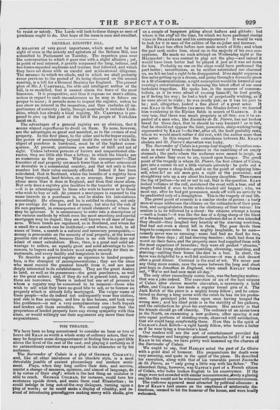GENERAL REGISTRY BILL.
A MEASURE of very great importance, which must not be lost sight of even in the anxiety and agitation of the Reform Bill, was submitted to Parliament on Tuesday. The reporters pass over the conversation to which it gave rise with a slight allusion ; yet, in point of real interest, it greatly surpassed the long, tedious, and ten-times-repeated sophisms and truisms that followed, and which they have set down with so careful and rnisbestovved diligence. The measure to which we allude, and to which we shall probably recur previous to the period of its being discussed on the second reading, is a bill for a General Registry for England. The present plan of Mr. J. CAMPBELL, the able and intelligent author of the bill, is so modelled, that it cannot- alarm the fears of the most timorous. It is prospective. and thus it exposes no man's affairs, unless in regard to such incumbrances as he may in future see proper to incur; it permits none to inspect the register, unless he can show an interest in the inspection, and thus excludes all im- pertinence of curiosity; lastly, though nominally it includes York- shire, which has already a local registry, Mr. CAMPBELL is pre- pared to give up that part of the bill if the people of Yorkshire Insist on it.
The advantages of a general registry are so obvious, that it seems almost superfluous to dwell on them. To none, however, are the advantages so great and manifest, as to the owners of real property. In the first place, to the seller and to the buyer equally, the power of ascertaining beyond doubt the extent to which the object of purchase is burdened, must be of the highest conse- quence. At present, purchases are matter of faith and not of sight. Unless between persons of known and unquestioned cha- racter, they are little else than a lottery, in which the blanks are as numerous as the prizes. What is the consequence?—That transfers of real property are much fewer than is either convenient or desirable in a commercial country, and that not only is their number but their value seriously affected. Indeed it has been calculated, that in Scotland, where the benefits of a registry have long been enjoyed, land fetches, on an average, four years' pur- chase more than it does in England, and from that cause alone. Not only does a registry give facilities to the transfer of property —it is as advantageous to those who wish to borrow as to those who wish to buy or sell. At present a mortgagee is exposed to the same hazards as a purchaser is, and he makes his calculations accordingly. He charges, and he is entitled to charge, not only a per centage for the loan of his money, but also for the risk of its non-payment, in consequence of latent claimants of whom he may be ignorant. It is unnecessary to enter into a description of the various methods by which even the most searching and careful mortgagee may be duped; they are well known to all men of busi- ness. Where bonds are registered, as in Scotland, and where for a small fee a search can be instituted,—and where, in fact, in all cases of loans, a search is a natural and necessary prerequisite,— money is procurable on the security of real property, at the lowest possible rate of interest, because there is no risk which does not admit of exact calculation. Here, then, is a great and solid ad- vantage to sellers, an equally great and solid advantage to bor- rowers, to buyers and to lenders most ample security for their in- vestments, and every facility and temptation to invest. To describe a general registry as injurious to landed proprie- tors, is the strangest of ;misrepresentations ; they are the class who must receive the greatest benefit from it, and are most deeply interested in its establishment. They are the great dealers in land, as well as its possessors—the great purchasers, as well as the great sellers ; and, if they do not in general lend, many of them are borrowers. There is indeed but one set of persons to whom a registry may be conceived to be inimical—those who wish to sell what they have no good title to sell, or to borrow on property which is already fully mortgaged. The vulgar name of these people—who do indeed not unfrequently wear fine clothes, and ride in fine carriages, and live in fine houses, and look very like gentlemen—is not a very complimentary one : both buyers and lenders call them swindlers. We cannot suppose that the proprietors of landed property have any strong sympathy with this class, or would willingly use their arguments any more than their acquaintance.


























 Previous page
Previous page